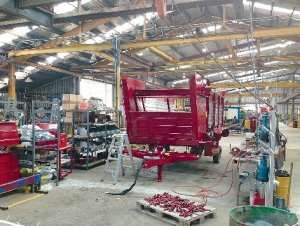GILTRAP ENGINEERING has found another gear by adopting a philosophy developed in Japan.
The company, in business for at least 50 years, hasn’t stood still, constantly increasing the footprint of its manufacturing plant, staff numbers and product range. Now like many New Zealand companies, it has taken its operating efficiency and quality assurance to a new level by following the principles of ‘lean manufacturing’ – a technique of constant improvement initially developed by Toyota.
The benefits have flowed throughout the business: factory staff are more effective and feel they have a voice, productivity has increased and quality control has improved.
Now the advantages are flowing to Giltrap customers in the form of a three-year warranty, a by-product of the enhanced confidence Giltrap management has in the output of the business.
As proven by Toyota and many other companies adopting the constant improvement philosophy of lean manufacturing, the advantages of all this enhanced efficiency, communication flow, staff buy-in, waste reduction and self-auditing is not just a better bottom line: better products roll off the assembly line.
The entire Giltrap factory, on the outskirts of Otorohanga, has gone through the ‘lean’ mill, with staff and management putting every workflow under the microscope looking for ways to improve the factory layout, sharpen assembly line procedures, define lines of reporting and tidy up work spaces.
The engineering staff have themselves gone through the same process, being put into teams encouraged to take responsibility for their own work and required to audit the work of the other teams.
Giltrap managing director Craig Mulgrew and sales and marketing manager Eric Crosby have been impressed with way the factory staff have taken ownership of the production process.
If any team along the assembly line feels the preceding team have not done their part of the job properly, they push the machine – be it a bale feeder or a feed wagon – back down the line to be done again.
No machine makes it to the front door without being subjected to this rigorous internal auditing. All information gathered on the factory floor is logged, discussed by the teams and used to further sharpen the products and the manufacturing process.
And the self-examination doesn’t end at the showroom or dealer’s yard.
Buy a Giltrap product and expect a follow-up after six months. Also expect the comfort of the three-year warranty, which sits on top of a manufacturing process locked into the never-ending philosophy of lean manufacturing – constant improvement.


















